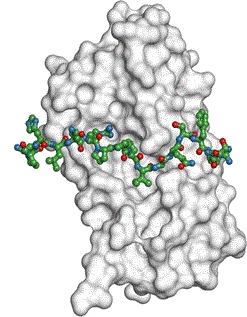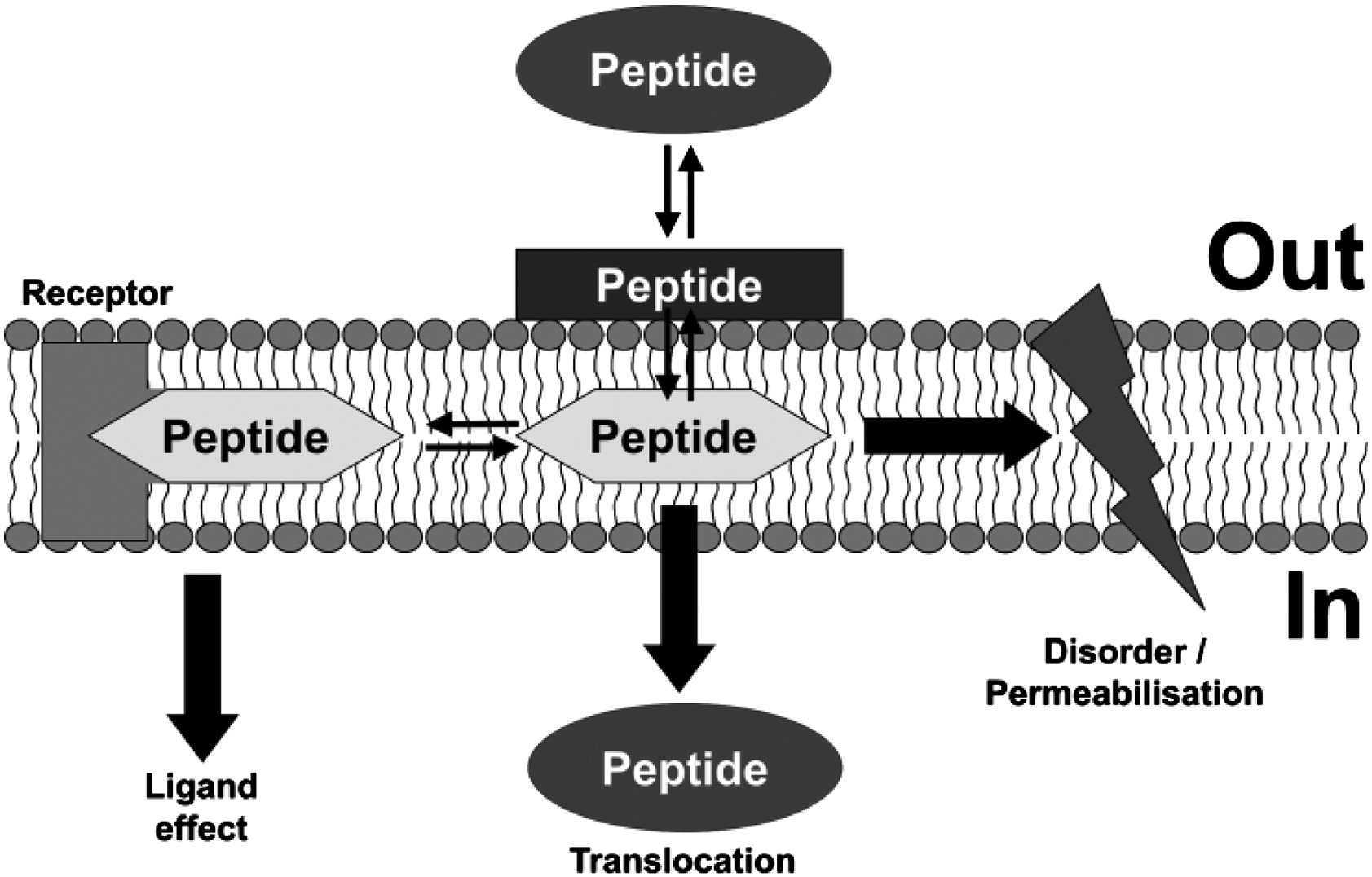Peptide-Biomolecule Interaction Identification Service
- Target Screening and Mechanism Study for Peptide Drugs
- Signal Pathway and Regulatory Mechanism Research
- Functional Validation of Natural Bioactive Peptides
Peptide-Biomolecule Interaction Identification Service is a professional service that systematically identifies the interactions between peptides and various biomolecules (including proteins, DNA, lipids, etc.) through multi-dimensional technical means such as mass spectrometry, affinity capture, and biophysical analysis. This service can be applied to multiple fields such as drug screening, target validation, signal network analysis, and functional peptide development, providing strong support for revealing the mechanism of action of peptide molecules.

Kozlovskii I. Popov P. J Chem Inf Model. 2021.
Figure 1. Peptide-protein binding diagram.
Peptide-Biomolecule Interaction refers to the specific binding or regulatory events that occur between peptides and biomolecules such as proteins, nucleic acids, and lipids. Peptides play diverse regulatory roles in biological processes, and their mechanisms of action often depend on specific interactions with other biomolecules. Whether in signal transduction, transcriptional regulation, pathogen recognition, or targeted therapy, peptides-with their small size, high specificity, and structural diversity-have become powerful tools for functional exploration and drug development. Systematically identifying interactions between peptides and target molecules is a critical step in understanding their functional mechanisms, developing bioactive peptides, and validating drug candidates.
Services at MtoZ Biolabs
MtoZ Biolabs offers Peptide-Biomolecule Interaction Identification Service to efficiently identify interactions between peptides and a variety of biomolecules, supporting mechanistic research, target validation, and novel drug candidate screening. Our service integrates multiple advanced technologies, including liquid chromatography-tandem mass spectrometry (LC-MS/MS), surface plasmon resonance (SPR), isothermal titration calorimetry (ITC), nuclear magnetic resonance (NMR), and circular dichroism (CD), ensuring high sensitivity, specificity, and quantitative capabilities in interaction analysis. The service covers interaction profiling between peptides and a range of key biomolecules:
Peptide-Antibody Interaction Analysis
Comprehensively evaluates the binding characteristics between antibodies and peptides, providing structural and functional insights for antibody screening, validation, and target identification.
Peptide-Peptide/Protein Interaction Analysis
Identifies interactions between peptides and target proteins or other peptides, reveals binding sites and regulatory mechanisms, and supports drug target validation and functional peptide development.
Peptide-DNA Interaction Analysis
Analyzes the specific binding behavior between peptides and DNA sequences, contributing to studies on transcriptional regulation, DNA damage repair mechanisms, and nuclear localization signal recognition.
Peptide-Lipid Interaction Analysis
Detects interaction characteristics between peptides and lipids, applicable to the study of transmembrane transport, cellular uptake, and antimicrobial peptide mechanisms.

Matos PM. et al. Biochim Biophys Acta. 2010.
Figure 2. Outline of peptide-membrane interactions.
Service Advantages
Advanced Analysis Platform: MtoZ Biolabs established an advanced Peptide-Biomolecule Interaction Identification Service platform, guaranteeing reliable, fast, and highly accurate analysis service.
One-Time-Charge: Our pricing is transparent, no hidden fees or additional costs.
High-Data-Quality: Deep data coverage with strict data quality control. AI-powered bioinformatics platform integrates all Peptide-Biomolecule Interaction Identification data, providing clients with a comprehensive data report.
Customized Experimental Design: Experimental plans can be tailored according to specific research objectives, accommodating different classes of biomolecules.
Integrated Structural and Functional Analysis: In addition to providing data on interaction presence and strength, follow-up conformational studies can be conducted to reveal key binding sites and underlying mechanisms of action.
Applications
Application examples of Peptide-Biomolecule Interaction Identification Service:
Identify binding characteristics between peptides and biomolecules to support the discovery of potential drug targets, elucidate mechanisms of action, and accelerate the development and optimization of peptide-based therapeutics.
Detect interactions between functional peptides and signaling proteins or transcription factors to uncover their roles in regulating cellular processes such as proliferation, differentiation, and apoptosis.
Validate the binding behavior of naturally derived peptides (e.g., antimicrobial peptides, endorphins) with their molecular targets to clarify their mechanisms of action.
Related Services
Protein Interaction Analysis Service
How to order?







